The following is the text of the intervention Mike Brady, Baby Milk Action’s Campaigns and Networking Coordinator, gave at the Nestlé shareholder meeting on 7 April 2016. This is as given and is followed by the response from Nestlé Chairman and former Chief Executive, Peter Brabeck-Letmathé. The current Chief Executive is Paul Bulcke, who spoke at the opening of the meeting on the pride shareholders should have in Nestlé’s 150-year history. Click her for Baby Milk Action’s press release.
 Baby Milk Action has raised concerns over many years, after being donated two shares to do so. Mike Brady has himself attended recent meetings to speak (right in 2015) and was greeted by Mr Brabeck with “Hello Mike” when he took the podium this year.
Baby Milk Action has raised concerns over many years, after being donated two shares to do so. Mike Brady has himself attended recent meetings to speak (right in 2015) and was greeted by Mr Brabeck with “Hello Mike” when he took the podium this year.
Mike Brady’s intervention:
Dear shareholders and board, my name is Mike Brady, and I will be speaking in English.
As we all know, this year marks 150 years of Nestlé. There are many things the board wants to celebrate and to highlight in the new Nestlé Nest museum.
But we should remember that some people are not celebrating. They have concerns. We have heard about some of the concerns from other speakers.
[Mike was going to raise the following issues, but most were covered by a speaker from ACTARES and another speaker: There are people taking legal action to stop Nestlé taking water from their communities. There is long-running legal action in the United States brought on behalf of former child slaves who worked on cocoa plantations. There are concerns about treatment of members of trade unions and farmers who have lost their livelihoods.]
Look at the Twitter feed for Nestlé’s 150 years and you will find additional information.
I am from Baby Milk Action and the International Baby Food Action Network (IBFAN) and our concern is how Nestlé markets baby foods.
I would first like to welcome the fact that Nestlé has made changes over these 150 years. We know that Henri Nestlé’s first product was farine lactée – milk, sugar and flour. Very soon this was being exported around the world, including to developing countries. Adverts at the time said it prevents diarrhoea and vomiting. Today Nestlé would not sell a product like this for feeding newborn babies.
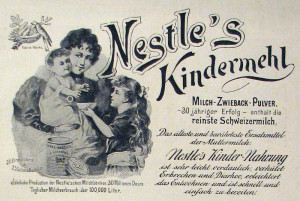
[Above: Nestlé’s history of undermining breastfeeding: “the oldest and most trusted substitute for mother’s milk”, “prevents diarrhoea and vomiting”].
The same is true of sweetened condensed milk. Nestlé marketed this as “ideal for delicate infants”, but it was not ideal. It lacked vitamins and babies were at risk of rickets, blindness and death. A famous speech in 1939 by Dr Cicely Williams referred to the, “massacre of the innocents by unsuitable feeding”.
These products did not provide the protection that breastfeeding provides. The products Nestlé currently sells do not provide the protection that breasteeding provides either. They are not the same. Indeed, the formula Nestlé sells at the moment is being replaced because Nestlé says that babies fed on it receive protein in “excess of requirements”. Nestlé is replacing it with a new formula.
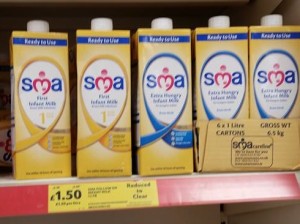
[Above: clearance display of Nestlé infant formula with “excessive protein” in the UK in February 2016. The Department of Health asked Trading Standards to remind Nestlé that promotions such as this break UK regulations.]
We are not saying that Nestlé should stop selling infant formula. We do not include infant formula on the list of Nestlé products we ask people to boycott, because sometimes it will be necessary. But we are asking you to market it responsibly and in accordance with World Health Assembly marketing requirements. The boycott of Nestlé’s other products will continue until this happens to give those practices a financial cost.
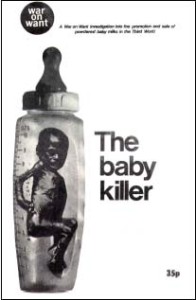
[Above: The Baby Killer report, 1974, from War on Want, a founder of Baby Milk Action].
We report violations to you. For example, we have asked you many times to stop the practice of promoting infant formula with the claim it “protects” babies and is the “gentle start”. Babies fed on formula are more likely to become sick than breastfed babies and in conditions of poverty more likely to die. Figures published in the Lancet in January this year suggest 823,000 babies lives could be saved every year if breastfeeding rates improved.
Nestlé eventually accepted it was wrong to market sweetened condensed milk and farine lactée for feeding babies and it wouldn’t do this today. Mr Brabeck, maybe in 20 years time your successor will be distancing the company from practices that you defend today. You could prevent that by accepting the four-point plan for saving lives and ultimately ending the boycott. We have put it to Nestlé many times. And I welcome you to accept it today.
To close, shareholders, as we think of these 150 years let us also remember the mistakes Nestlé has made in the past and the babies who died as a result. Not everything is to be proud of Mr. Bulcke.
And let us call on the board to stop the practices today that put lives at risk.
So I ask you, shareholders, to join me in standing for a minute’s silence to remember those dead babies and to show you want Nestlé’s practices in the future to change.
[whistles from some shareholders]
So please, shareholders, a minute’s silence.
Mr Brabeck (speaking immediately):
Okay, well, thank you very much, Mike. I will give an answer in English.
First of all, I think it is absolutely unfair to compare a product that is developed on a scientific base in 1866, to compare it with a product of 2016 and to say you wouldn’t sell this product as a breastmilk substitute. You have to see this thing in its context. In 1866 this was a product that saved the lives not of one child, of millions of children. Okay, so why don’t we stand up and celebrate the lives we have saved with this product, instead of the lives we have…
[applause]
I have heard and I have taken notice that your position has a little bit changed, which I took notice and I appreciate. That it’s not anymore a fight about Nestlé should not be selling infant formula, that we have to be more responsible in the way how we market it. [Note: this has always been Baby Milk Action’s position – see below]
And I repeat what I have said before, I’m not pretending that this company is 100% perfect. We have and we can have and we might have accidents. That happens. And we take very seriously those indications that we receive, whether they’re coming from you, whether they are coming from independent auditors, whether they’re coming through our “Tell Us” system that we have, that are coming through from the Ombudsman.
Serious. We look at them, we see if we have failed, and if we have failed we make remedies. We go as far, that in one year alone, we have fired three people because they have been violating the Code.
So, I don’t think we can say that we are 100% perfect, but what I can assure you and the shareholders is that every single case, we take it serious, we investigate, and if we see that we have been failing, we take action against this. That I can assure you. Thank you very much.
[applause]
Mike Brady responded:
Mr Brabeck, I think that it’s a shame that you didn’t give the shareholders even one second to remember the babies that have died.
We are not saying that you shouldn’t sell these products. I said that very clearly, and we have always said that. It is the way they are marketed and have always been marketed in ways that undermine breastfeeding.
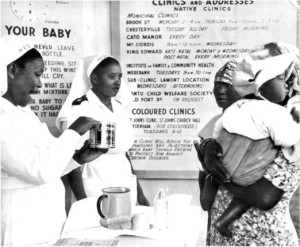
[Above: Nestlé milk nurses promoting formula at a clinic in apartheid South Africa]
And that is something that Nestlé is still doing.
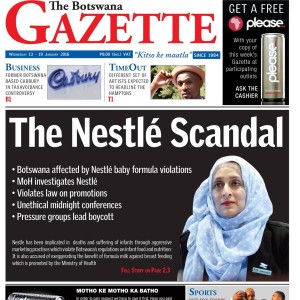
[The scandal continues: The Botswana Gazette exposes Nestlé formula marketing violations in January 2016 – Ministry of Health investigating Nestlé – official pictured]
You are still promoting it with the claim that it “protects” babies.
You could have the opportunity today to say that you would remove that claim.
Mr Brabeck:
Okay. Thank you very much. Mr. Piffner [for the next question].
Why did Mr Brabeck pass up the opportunity to say Nestlé would stop promoting infant formula with the claims it “protects” babies and is the “gentle start”? Because these marketing campaigns are a “growth engine” for “incremental sales”. In a presentation to investors in September 2013, Nestlé called the strategy “Project Happy”. Below.
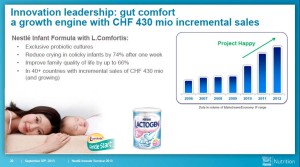
Mr Brabeck misled shareholders when he said Baby Milk Action had changed its demands. The boycott campaign and the four-point plan (put to Mr Brabeck directly several times) clearly call for Nestlé to bring its baby food marketing policy and practice into line with the International Code of Marketing of Breastmilk Substitutes and subsequent, relevant Resolutions.

